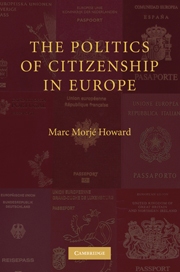Introduction
Published online by Cambridge University Press: 05 June 2012
Summary
The state is a compound made of citizens; and this compels us to consider who should properly be called a citizen and what a citizen really is. The nature of citizenship, like that of the state, is a question which is often disputed: there is no general agreement on a single definition: the man who is a citizen in a democracy is often not one in an oligarchy.
– AristotleAlthough Aristotle's quotation was written more than 2,350 years ago, it raises questions about citizenship that are still relevant today. Indeed, over the course of the last two millennia (and especially the past 50 years), scholars have focused much more on the state than on citizenship. Even leaving aside modern-day oligarchies, and just focusing on liberal democracies, Aristotle's questions appear timely within the recent context of globalization, large-scale migration, and the decline of many elements of nation-state sovereignty. Given the extent of variation within contemporary democracies, one could perhaps simply rephrase the last clause in the above quotation as follows: “the person who is a citizen in one democracy is often not a citizen in another.” But to what extent, and for what reasons, is this the case? And what are the implications for immigrant integration, national identity, and democratic politics in the modern era?
- Type
- Chapter
- Information
- The Politics of Citizenship in Europe , pp. 1 - 14Publisher: Cambridge University PressPrint publication year: 2009



